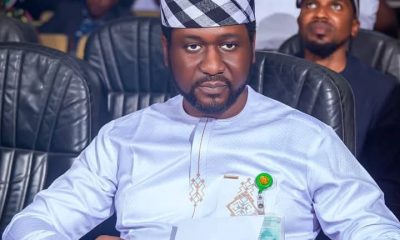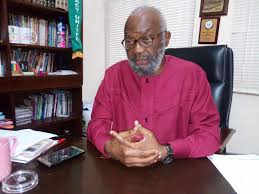NEWS
Prophet Cries out over Accusation of Killing in Enugu, Appeals for Intervention

From Sylvia Udegbunam, Enugu
The spiritual leader of Light of God Synagogue Church, Echezema Ibagwa-aka in Igbo-Eze, South local government area of Enugu State, Prophet Chinedu Ezedike Solomon, who has been accused of killing four children of the same parents, who incidentally were members of his church has cried out that he is innocent.
Solomon, whose story has gone viral that he allegedly killed the children of his church members, has denied any knowledge of the murder and called for unbiased proper investigation into what transpired on the fateful day, May 16, 2025 in the Property of Late Raphael Ezema near his church premises. Prophet Ezedike, who spoke to journalists at the premises of Enugu North Magistrate Court, Enugu before he was sent back to prison custody, explained that he was not around the very day the incident occurred but went to a customary court with my Lawyer and a friend.Vehemently denying that he was not a killer or a ritualist but a Man of God who uses prayers to deliver people from the spiritual and physical problems, said that he was set up and appealed to Gov. Peter Mbah of Enugu State, Fr. Ejike Mbaka of the Adoration Ministry, social critic, Very Dark Man and Brother Chigbo whom he described as a good man of God to intervene to see that Justice is done and the real culprit be found.He expressed deep lamentations over the heartless destruction of the Property he had been blessed with since 30 years he had been serving God. But insisted that his worry was not all his property that was destroyed but that his concern is to know what happened to the children who were like his own children.According to him, he started his spiritual work at the age of ten and for over thirty (30) years, God has been using him and wondered how all of a sudden he became a killer and a ritualist.To cut the story of his ordeal short, he said that before he was moved from Ibagwa to Area Command at Nsukka and later to Enugu Police Headquarters, his place was thoroughly searched but the only thing found in his house was a candle and a bottle of Olive Oil, pointing out that nothing indicting or incriminating was found on him, hence his appeal that a proper investigation be carried out to get to the truth of the saga.Explaining how he came in contact with Chinonso Ezema whose children were killed, he said that they had a problem of their male children not living beyond one month after birth before they died. He said that it was prayers and three days of dry fasting that made them have two male children that survived. . He said that they had been with him for eight years since he delivered them from their family problem.He said that because of the miracle God wrought, their parents named their first son after his name, Chinedu so that they will constantly remember the man that helped them when they were in distress.The Prophet further explained how he also met the person whom the parents are accusing of killing their children, Chukwuma Eze from Ede Obala in Nsukka local government. According to him, Chukwuma’s mother had a kidney problem and her stomach protruded and that she was taken to many big hospitals to no avail but with holy water and Olive Oil and prayers, within three months the woman regained herself and that was how Chukwuma and his family started coming to his church.He equally disclosed that at a stage, the Ezemas started coming to be sleeping in his church because robbers were terrorizing them and that it was like that the family of Chukwuma Eze and Chinonso Ezema came to know each other, adding that as time went on, Chinonso and Chukwuma started having issues of space to sleep in the Church and were often quarrelling thereby making the Ezema family to suspect that it was Chukwuma that killed their four children.Asked if he believed that it was Chukwuma who disappeared since that day the children were killed the children, Prophet Solomon said he would not know and cannot swear that it was he but said that no one could know what is in the heart of man but only God.He rather linked his set up and his ordeal to his soiled relationship with the traditional ruler of Amebo, Ibagwa, Igwe Hyacinth Eze whom he had issue of land with.He said that he bought many plots of land from Igwe’s family members and that the matter has gone to court and that since then they had become enemies, hence he accused Igwe Eze of being capable of colluding with the Chairman of Igbo-Eze South local government area, Ugo Ferdinand Ugwueze, who demolished his property when the incident came up claiming that it was Gov. Mbah that ordered the demolition of his property.He accused the chairman of collusion with Igwe because it was the chairman who allegedly blocked attempts made to find Chukwuma who is being accused by the children’s parents of killing them.He pointedly accused the chairman of blocking even the family of Chukwuma Eze from coming to see him in the Police Station at Ibagwa Aka among other things.Asked to comment on the development in his community, Igwe Hyacinth Eze said he was traveling and could not talk about the incident. I am going to the airport. I am traveling and I don’t know when I am coming back,” he said.On his part, the local government chairman, Ugwueze, said that he is not surprised that Prophet Solomon is claiming innocence or not guilty.NEWS
SPEAKER NAMES REP. UGBOR CHAIRMAN COMMITTEE ON SINGLE-USE PLASTIC BAN

Speaker House of Representatives Rt. Hon. Tajudeen Abbas has appointed Hon. Terseer Ugbor as Chairman Ad-hoc Committee on Single-Use Plastic Ban in Nigeria.The committee is mandated to access the preparedness, coordination, and roles of relevant federal agencies in implementing the planned ban on single-use plastics in Nigeria, with a view to ensuring effective enforcement, public awareness, and environmental sustainability.
The committee will also engage with the private sector stakeholders to access their preparedness to eliminate single-use plastics from their operations. The bold initiative to ban single-use plastics is a significant stride towards combating plastic pollution in Nigeria. According to reports, Nigeria ranks as the ninth-largest contributor to plastic pollution globally, generating approximately 2.5 million tonnes of plastic waste annually. Alarmingly, over 70% of this waste is discarded into landfills, waterways, or the ocean, posing hazards to both the environment and public health.The Deputy Chairman Committee on Environment will assume the notable role of heading the committee and ensuring the effective implementation of a single-use plastic ban in Nigeria. Hon. Ugbor has been an advocate for better environmental laws and policies. He sponsored the Endangered Species Conservation and Protection Bill, which has passed in the House of Representatives. He also sponsored the Environmental Impact Assessment (EIA) Ammendement Bill. He is also responsible for the End-of-Life Vehicle Regulations amongst others.Previously, Hon. Ugbor served as Chairman of the Ad-hoc Committee on Student Loans and Access to Higher Education, where he organised the first legislative summit on student loans in the National Assembly and proposed extensive ammendments to the students loans bill which was eventually passed into law. Hon. Terseer Ugbor is a thorough professional and a consultant in the area of environmental sustainability, resource recovery, and climate change.Dagu FredS.A Media and Publicity to Hon. Terseer Ugbor.24th July, 2025.NEWS
Return to PDP, Damagum Begs Defected Members

By Johnson Eyiangho, Abuja
The Peoples Democratic Party (PDP) has called on its founding members and others, who have left the party for reason or the other, to return, assuring it is willing to welcome them back to the fold.
Acting National Chairman of the PDP, Amb.
Umar Damagum, made the appeal at a meeting convened by the founding members of the party in Abuja on Wednesday as part of efforts to resolve lingering internal crisis within the party.Damagum said, “Let it be said and known that our doors remain open to those who wish to return, and it is my earnest prayers that in their return, they may rediscover themselves. After all, we are still the party that gave many their first political home.
“But we must also confront the hard truth, much of the injury the PDP has suffered has been self-inflicted. From the Obasanjo era to this moment, we have too often jettisoned ideology in favour of personal ambition.
“This has cost us dearly. Yet, there is still a beauty that exists only in the PDP; our founding vision, our commitment to internal democracy, our enduring mechanisms for dialogue and reconciliation, and our true national outlook. These are not ordinary attributes. They are the very pillars that made and have sustained the PDP as the bedrock of Nigeria’s democratic journey, and they remain our guiding strength today.”
However, former Governor of Niger State, Babangida Aliyu, countered the PDP Acting National Chairman, describing the party members who had defected as nomadic politicians, who cannot remain in the fold.
Aliyu said, “I heard both the (acting) chairman and the chairman of Governors Forum have been very diplomatic and saying, come back, come back. No, you don’t invite nomadic politicians back to your place. These were people with a history of nomadism.
“In nomadic life, your own selfish interest becomes more important than the interest of the people. So we need to understand that the lack of discipline has created this problem.
“We cannot continue like this, knowing that the black sheep in the family keep on destroying whatever we are building. And then you say, come back. In fact, the most shocking time, the most shocking period was 2019.
“Our constitution is specific. You leave the party; you join the queue. The party is not just to win elections. The party is also to ensure the culture of selling real, principled politics. So even if we don’t win elections, but we are one united, principled party, we will be recognized. Please, let us pay attention to what we should be doing, rather than looking at those people who will never, never, ever think of you, but only think of themselves.”
NEWS
As Nigerian Youths Rise against Tobacco Abuse

By Abiemwense Moru
By happenstance, 16-year-old Blessing Obiabo found herself on the frontline of a national movement.
Obiabo, a student of Lyngra Private Montessori School in Karu, Nasarawa State, found her voice the day Cedars Refuge Foundation (CRF) brought its anti-tobacco campaign to her school.
“We are not fools; this is our future, and we are taking it back,” she said.
Obiabo’s declaration mirrors a growing wave of youth-led resistance sweeping across Nigeria, fueled by the CRF’s Students Congress Against Tobacco (SCAT) initiative.
The programme, inaugurated under the banner of a “Tobacco-free Revolution,” is a response to what CRF describes as a calculated and aggressive invasion by the tobacco industry into the lives of young Nigerians.
The Executive Director of CRF, Mr Peter Unekwu-Ojo, minced no words at the campaign inauguration in Karu.
“The tobacco industry is a well-dressed cartel selling flavoured slavery.
“They are not selling lifestyle; they are selling addiction, bubble-wrapped in mango flourish and influencer smiles.”
According to Unekwu-Ojo, the tactics of the tobacco industry have become more deceptive than ever.
“Gone are the days of plain cigarettes; in their place are brightly-packaged e-cigarettes, vapes, and other nicotine products, flavoured, flashy, and dangerously appealing to teenagers.
“It is the same poison, just packaged in sleek tech and tropical flavours.
“These flavoured products, often promoted through digital marketing and pop culture influencers, create the illusion of harmless fun, masking the reality of addiction and long-term health consequences.”
The SCAT programme, now active in several schools across Nasarawa and Abuja, was created to expose and counter these tactics.
It promotes in-school advocacy, peer-led clubs, creative campaigns, and dialogues with teachers, parents, and community leaders.
Unekwu-Ojo emphasised the call for urgent reforms, including a nationwide ban on flavoured tobacco and nicotine products, higher tobacco taxes, strict penalties for marketing to minors, and the enforcement of school-based prevention programmes.
“If we do not protect the future in classrooms, we will be fighting addiction in clinics,” he warned.
Mr Abba Owoicho, CRF’s Programme/Operations Officer, weighed in.
“We are witnessing a silent epidemic thriving on ignorance and regulatory loopholes.
“SCAT is not just a campaign; it is a counter-offensive,” he said.
At the school level, educators are stepping up.
Mrs Blessing Onu, Head Teacher at Lyngra, welcomed the initiative.
“Our students will not be left defenceless in the face of such a manipulative industry,” she said, announcing the establishment of a Tobacco-Free Club in the school.
Mr Pius Nnaemeka, a senior teacher, appealed directly to national authorities.
“If we continue to play soft while our children inhale poison, history will not forgive us.
“The government must outlaw flavoured tobacco, fund preventive education, and support civil society groups championing this cause,” he said.
These school-based actions are mirrored across other institutions.
At Klinnicaps Academy in Koroduma, another CRF outreach event themed “Exposing Lies, Protecting Lives” engaged students in interactive sessions that peeled back the façade of flavoured products.
Unekwu-Ojo told the students that the industries were setting young people up against their future.
“They sandwich their products with glamorous colourful packaging and high-profile adverts, hiding the dangerous consequences of addiction.”
He described the educational sessions as a wake-up call.
“Tobacco use is not a fashion statement; it is a death sentence disguised in shiny colours,” he said.
Mr John Egla, Executive Director of Development Initiatives for Societal Health, reinforced the message: “There is no safe level of smoking.”
He cited global statistics from the 2018 Tobacco Atlas, noting that more than 942 million men and 175 million women worldwide smoke, with rising usage among African youth.
In response, CRF is establishing Tobacco-Free Clubs in at least 10 more schools in Nasarawa State, equipping students with peer leadership and advocacy tools.
The message is resonating beyond classrooms.
In Katsina State, the Commissioner for Health, Alhaji Musa Adamu-Funtua, recently stressed the importance of school-based campaigns.
Speaking during World Tobacco Day celebrations, he warned that a society that allowed the exploitation of its youth by profit-driven tobacco companies is a society at risk.
Adamu-Funtua urged joint efforts among government agencies, civil society, parents and youths.
“Let us choose health over harm, strength over addiction,” he said.
The Civil Society Legislative Advocacy Centre (CISLAC) has also thrown its weight behind tobacco control.
At a recent workshop in Bauchi, its Senior Programme Officer, Mr Solomon Adoga, highlighted tobacco’s role in multiple cancers and reproductive health challenges.
“Tobacco significantly contributes to Nigeria’s cancer burden,” he said.
CISLAC’s Executive Director, Auwal Rafsanjani, called for urgent policy reforms, stronger laws, and intensified awareness campaigns to stem tobacco-related deaths.
Beyond the halls of policy and classrooms, the anti-tobacco wave is being carried by mothers.
In Ilorin, Kwara, a march led by Bundies Care Support Initiative and other groups amplified maternal voices demanding action.
Mrs Funmilayo Osiegbu, Executive Director of the initiative, sounded a note of warning.
“We cannot stand by while our children are exposed to harmful tobacco products.
“We are urging the government to enact policies that shield young people.”
Inspired by international campaigns such as Tobacco-Free Jordan, the Kwara mothers demanded full implementation of Nigeria’s National Tobacco Control Act.
“This includes stricter enforcement of bans on advertising and sponsorship, and stronger measures to prevent youth access,” she said.
Kwara’s Commissioner for Women Affairs, Mrs Afolashade Opeyemi, reaffirmed government’s support.
“The administration has zero tolerance for smoking any substance,” she said.
Also, health experts lend their support.
Prof. Abiodun Afolayan, Chair of the Nigeria Cancer Society in Kwara, warned that lung cancer had become the most common cancer worldwide, driven largely by smoking.
“Often, the damage only appears when it is too late,” he said.
Mr Lekan Mikail, Special Adviser on Drug Abuse to the Kwara Governor, urged parents to stay vigilant.
“We must protect our children from this slow and silent killer,” he said.
As the SCAT initiative prepares to expand to 30 schools by 2025, it is clear that a national youth-driven movement is taking root.
From Obiabo’s defiance to policymakers’ endorsements, Nigeria is witnessing a shift in its tobacco control landscape.
But for CRF’s Unekwu-Ojo, the work is far from over.
“Every child deserves a future free from the industry’s traps, flavoured nicotine, flashy adverts, and peer-induced pressure,” he said.
His words echo in classrooms, streets, and government chambers across the country; the call is no longer just to awareness, but to action.
Mrs Precious Ojiaku, Dean of Studies at Klinnicaps Academy, said tobacco had no place in the future of Nigerian youth.
“Living a morally grounded life and rejecting these traps is the strongest resistance we can teach,” she said.
With the ongoing concerted efforts, stakeholders believe the threat posed by tobacco can be contained.(NAN)
| ReplyReply allForwardAdd reaction |



















